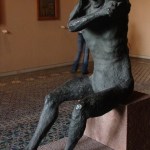DesiPundit
My father recalled sometime back the terrible drought that happened when he was a child: since the grains were running low, my grandfather would go out and dig tubers from surrounding fields, my grandmother would make something out of it for the kids. It is an experience that is far removed from my own. My father's occasional re-telling of this episode of his life affects me deeply, more so, because, although the effects of drought on rural p[oor has been minimized by the work of Amartya Sen, Dr Swaminathan and many others in the past decades, the effects have not been minimized to a level…
I loathe tech support so I switched my parents to Ubuntu a while ago. But, you may not be so lucky. Your parents may not like Ubuntu. I can't imagine why they wouldn't, but, if they don't and they must absolutely have Windows, then use Windows SteadyState. It's free. [via this /. thread]
Read an interesting interview with Roger Penrose at Discover Magazine. Found this part fascinating:
So Schrödinger himself never believed that the cat analogy reflected the nature of reality?
Oh yes, I think he was pointing this out. I mean, look at three of the biggest figures in quantum mechanics, Schrödinger, Einstein, and Paul Dirac. They were all quantum skeptics in a sense. Dirac is the one whom people find most surprising, because he set up the whole foundation, the general framework of quantum mechanics. People think of him as this hard-liner, but he was very cautious in what he…
As I was stuffing my face today, I wondered if the Universe cared. The short answer is no. The slightly longer and more depressing answer is: my existence is more marginal than a speck of stray DNA on a grain of sand staring at vast oceans (that's literally true, oh the irony...). Clearly, there's no point to existence except amusement. So, here's some:
On average, each of us human beings from birth till death consume about (2000 per day x 365 days x 70 years) calories. That is a pretty big number (51,100,000 calories).Big, of course, is a relative term. The big calories translates to about…
So, I am in India for a short trip and was in Coimbatore yesterday. A truck almost collided with the autorickshaw (three-person tincan with an engine strapped on) I was riding in, then a bus gently nudged me as I was walking on --what I thought was clearly marked--a pedestrian path.
Things fall apart: this is a generally known in scientific circles as the second law of thermodynamics. In India, even the laws are subject to this law. Everything --including rules and laws--slowly reduce to a state of lawless equilibrium. After a while, someone or something explodes, and then things start to…
They are already here, they are amidst us, they zip through our heads affecting LHC funding, they come from future and cunningly prevent their production at LHC by affecting the present. Meet Bosons from the future.
So, this in short, is the paper by two physicists discussed in this NY Times article.
Dr. Nielson said of the theory, "Well, one could even almost say that we have a model for God." It is their guess, he went on, "that He rather hates Higgs particles, and attempts to avoid them."
This malign influence from the future, they argue, could explain why the United States…
Let's see if we can figure this out from first principles. Limiting ourselves to biological evolution, evolution needs a few things to work in practice:-
-a mechanism of inheritance. Genes in our case. Consider stones. Stones don't have genes. Stones don't evolve (biologically, that is. I know a pebble back in my village river that somehow manages to accumulate little pebbles around it that are more smooth. I think it's cheating.)
-one or more heritable characteristics. For instance, Lactose tolerance. Our ancestors couldn't stomach milk--until about 30,000 years ago. Lactose tolerance…
Congrats to all the participants who took the critical first step by courageously sending your baby into the wild. The number of submissions this year is eleven which is not too many. I hope to provide good feedback to authors as I can spend more time with fewer stories.
The book preparation is coming along fine. An illustrator living in NY is doing the illustrations for the stories. The site logo has been re-designed and it'll go on the book cover as well. Here's a draft (there are a few other variants of this theme):
I'll share the illustrations when they are ready.
Alright. Now, you have no excuses. Send it in before I come and snatch it. Here is the link to go to, if you have not heard about the contest.
A very limited list of things that nobody knows (as compiled by yours truly, a very limited human). As you may notice, most of the list treads close to things that may be broadly classed as epistemological questions. Do extend it with your own unknowns. There are some other more comprehensive lists: Science Magazine's list from 2005. NY Times list from 2003. A New Scientist list from 2005.
What's the matter with prime numbers. (Reimann Hypothesis)
What are the fundamental constituents of the universe. (see last question)
What is a dimension. How many of it does the universe have.
Can life as…
There is, I must say, a rather unconventional article in New Scientist called Evolution's third replicator: Genes, memes, and now what? by Susan Blackmore about ... what's the word I am looking for...hmm.. Human Culture + Technology.
Susan suggests that we have unleashed a technoculture goo. Remember Eric Drexler's Engines of Creation? Something like that--with mixed metaphors but without the encumbrances of technical nitty-gritty that Drexler had. So, what's this goo? Let Susan explain, because however hard I tried I could not write a summary (and I tried very hard, trust me).
What do I…
Sympathy, help, and a positive engagement. - Robert Louis Stevenson.
That partial quote is from a fascinating essay called My First Book by the same author. A must read for all young writers. Here's a bit more:
The accepted novelist may take his novel up and put it down, spend days upon it in vain, and write not any more than he makes haste to blot. Not so the beginner. Human nature has certain rights; instinct--the instinct of self-preservation--forbids that any man (cheered and supported by the consciousness of no previous victory) should endure the miseries of unsuccessful literary toil…
In India snakes charm you. Yes, they do, especially if you are a legislator in Orissa state assembly.
Have time to hear a personal anecdote of the charms of snakes? Here we go.
When I was about 6 or 7, I used to roam around the fields in my mother's native village (google map). There were two rocky mounds, each about the height of a four storey building covering perhaps five football fields. It was a magical space for young children. At times, the magic would be enhanced by a fight between a snake and a mongoose (mongoose eats snakes, there were days as a child when I wanted to be one). So…
Recently discovered the works of Raqib Shaw. Raqib Shaw was born in Culcutta, spent his youth in Kashmir and now lives and works in London.
There are conflicts at so many levels in Raqib Shaw's paintings that, as we look at it, we are drawn deeper and deeper into a strange, fantastical and unsettling world.
One can detect a potent mix of western and eastern influences in the the paintings. Raqib Shaw explains in an interview: "Japanese look at my work and think it's Japanese, Indians look at my work and think this is Indian. But, [I think my art is ] a very mediocre example of what is to…
Never thought about the cover page of a book as much as I am doing now. With the upcoming TheScian Stories book, all things bookish has become an obsession. Yesterday evening, wife was plugging away at the numerous things that need to be arranged before publishing a book and she had covered the table with the covers of various SF books (Neuromancer, The Long Dark Tea-Time of the Soul, The Dispossessed, The Collected Stories of Arthur C. Clarke, and more). I noticed a theme in all the covers (except Neuromancer): diffused backlight as if a star was lurking behind. This thematic convergence, I…
This year's contest announcement is up at TheScian.com. Get going. There are three prizes and a book deal up for grabs.
With the selected stories of this year, we'll have a fantastic collection of stories for our first book. Four years in the making! Thanks to all the participants and readers.
While you are tender with good intentions, can I snag you for a little survey so we know what's in store for TheScian Stories Book? Click here to take it (opens in a pop-up window) or use the direct link.
I am sitting at the window seat of the Alitalia flight. It is flying over the Italian alps near Milan, few minutes away from landing. The sun is setting behind the alps creating a vast dynamic art that sweeps slowly across as the aircraft moves over the mountains; a small house besides a stream in the valley beneath, clouds resting halfway up the mountains. And, this is just in the tiny bit of earth and sky that I happened to pass through. Spectacular, sublime, artistic beyond human comprehension.
What is Art? Can art be for itself, without a context, without a witness? Universe as an…
Comprehensive review of the state of affairs at New Scientist. Surprisingly, the biological mechanism and the reason (or lack of it) for this is still not well known. My last conversation about this was about 12 years ago with a medical student friend of mine in college who obsessed over female ejaculation (he went on to win the top rank at his university, so, I guess it was a healthy obsession). Nothing much has been added to our understanding in all these years, it seems. Is this the female equivalent of moobs (man-boobs)?
The Red Planet is all over the revamped IEEE Spectrum website. I enjoyed reading Kim Stanley Robinson's 10 Favorite Mars Novels and CMU Team's Google Lunar X Prize efforts. There is an interview with Madhavan Nair, head of ISRO, podcasts by astronauts and more. Hop over to Why Mars? Why Now?
How can you see hummingbirds, roses, orchids and not believe in Lord's splendor? But, if you're going to look at those things, you should look at other things, too. Think of an African boy with a parasitic worm boring into his eye. If you tell me God not only created but cares for us all, what about that boy? Are you telling me he says: "I understand. God deliberately created a worm that is going to blind me?" I find that intolerable.-David Attenborough in a recent New Scientist interview.*
As an optimist, I believe people are curious by nature and don't want to be willfully ignorant (…



